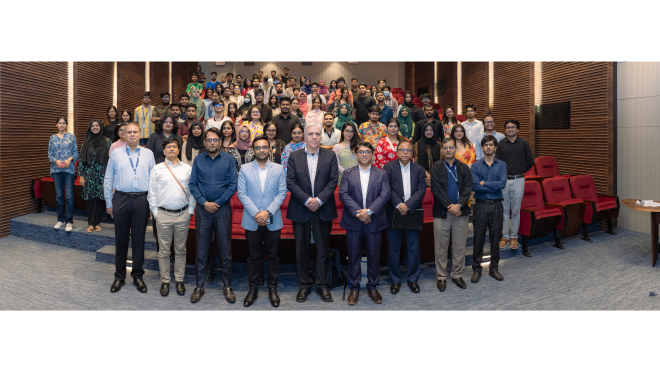IUB hosts discussion on the role of central bank in the economy
IUB hosts discussion on the role of central bank in the economy

Independent University, Bangladesh (IUB) organised a special session titled “The Role of the Central Bank in the Economy” on 23 October 2025, featuring Dr Md Azad Uddin, Additional Director of Bangladesh Bank, as the keynote speaker. The event brought together students and faculty members to explore the central bank’s role in promoting financial stability, development, and inclusion amid global and domestic challenges.
In his welcome remarks, Professor Raisul Awal Mahmood, PhD, Dean of the School of Business and Entrepreneurship, introduced Dr Uddin and highlighted his experience in applied development policy, migration, and remittance research. He also raised critical questions regarding Bangladesh Bank’s autonomy, regulatory oversight, and recent financial mismanagement, setting the stage for a thought-provoking discussion.
Dr Uddin began by tracing the evolution of financial systems—from barter to modern banking—explaining how structured institutions emerged to facilitate exchange and efficiency. He discussed the economy’s two key sectors, households and businesses, underscoring the regulator’s role in balancing consumption, production, and savings.
Detailing Bangladesh’s financial landscape, Dr Uddin noted that 61 banks, including six state-owned commercial banks, operate under a 1:1 urban-to-rural branch ratio to ensure financial inclusion. He highlighted mobile banking’s growing contribution in reaching marginalised communities but cautioned that recent liquidity constraints have slowed loan disbursement, affecting both lenders and borrowers.
He outlined Bangladesh Bank’s three core objectives—maintaining price stability, exchange rate stability, and economic growth—and elaborated on monetary tools such as the Interest Rate Corridor, Reserve Requirement, Discount Rate, and Open Market Operations used to manage liquidity and inflation.
Dr Uddin attributed the decline in the country’s foreign exchange reserves—from USD 42 billion to around USD 21 billion—to high import pressures, market volatility, and continued interventions to stabilise the taka. The central bank, he said, is supporting export-oriented industries through the Export Development Fund while incentivising remittance inflows with a 2.5% cash reward.
Highlighting the central bank’s developmental initiatives, he cited TakaPay, digital banking, and low-cost account facilities as key drivers of the transition toward a cashless economy, enhancing access and reducing dollar dependency.
Addressing questions on the merger of five struggling banks, Dr Uddin explained that the decision aimed to safeguard depositor confidence, noting that most accounts hold deposits below BDT 2 lakh. On inflation and foreign direct investment (FDI), he clarified that while FDI promotion is under BIDA’s purview, Bangladesh Bank supports stability through exchange rate management and remittance incentives.
He also acknowledged the limited use of data-driven policymaking in Bangladesh, saying the central bank is working toward adopting econometric and DSGE (Dynamic Stochastic General Equilibrium) models to improve monetary policy formulation.
The session concluded with remarks from the Pro-Vice Chancellor, who stressed the need to enhance public understanding of central banking. Dr Khaled Saifullah, Assistant Professor and Head of the Department of Economics, expressed optimism that Bangladesh will one day achieve economic self-reliance without excessive dependence on international financial institutions.


